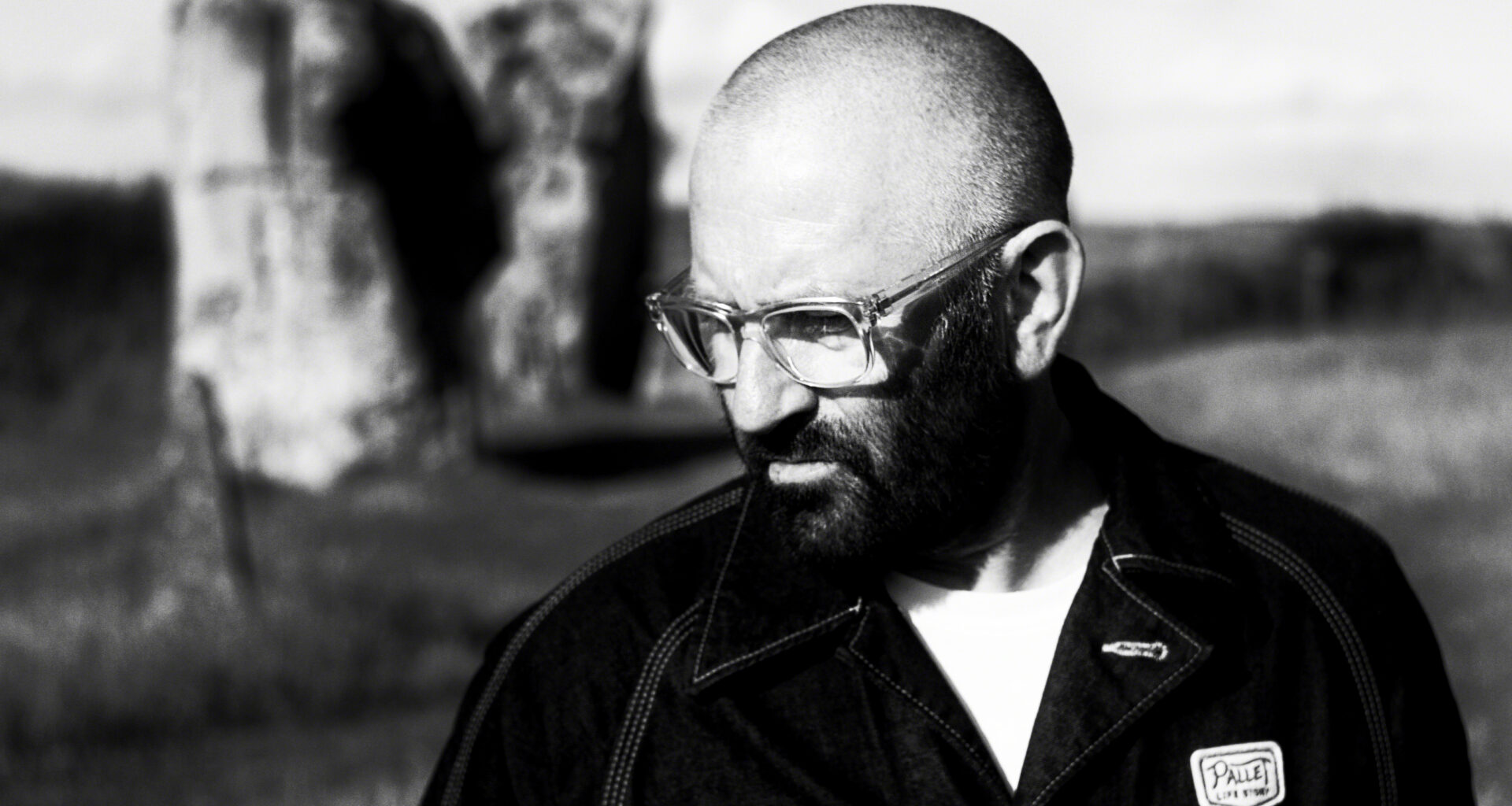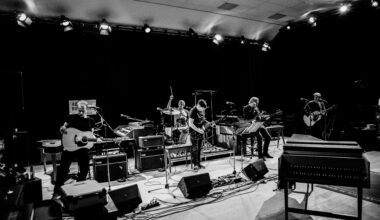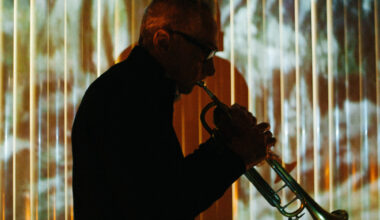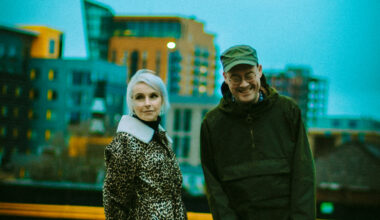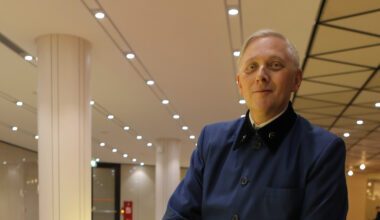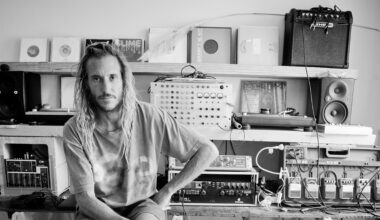Clock DVA/The Anti Group’s Adi Newton has projects coming out of his ears and they’re all heading towards yours via his soon-to-be very busy ARMComm label…
Fifty years since the sampler album appeared as a valuable commercial tool, then seemed to fade as a credible vehicle, Adi Newton has all but redefined the hoary format to tell the world about the renaissance happening within his Anterior Research Media Communications label.
Talking to Newton means encountering a blizzard of fascinating projects, works-in-progress, reissues and collaborations that would have filled the young Sheffield experimentalist who formed Clock DVA over 40 years ago with bewilderment and delight.
Most pertinent at the moment is the positioning of his label as a suitable funnel for his gushing creative faucet, starting with Sōon, his riveting collaborative project with kindred spirit Jack Dangers, and followed by ‘Sampler’ for a taste of things to come, including his first solo album, a resurrected The Anti Group and even a new Clock DVA album.
Our conversation is mostly about the first two releases, but it’s littered with plans for live events, bridging 12-inch singles, collaborations and more projects, along with the Mute reissues of Clock DVA’s albums on vinyl.
After flying determinedly below the radar since Clock DVA followed a similar path to Sheffield homeboys Cabaret Voltaire by appearing on a major label then heading back to the underground network they came from, Newton wants people to know about ARMComm, fully aware of the crowded marketplace it faces. He also wants people to know what he’s up to.
Coming from the Sheffield industrial scene that birthed the Cabs, Newton had been in early 70s collective The Studs, and The Future with Ian Craig Marsh and Martyn Ware before they formed The Human League. His next step, Clock DVA, made a squalling, freeform sound lashed with treated tape loops and an EMS Synthi E. Initial transmissions came as cassettes (gathered across three boxsets, ‘Horology’, issued by Vinyl On Demand), including 1980’s ‘White Souls In Black Suits’ on Throbbing Gristle’s Industrial label.
The following year saw Clock DVA top the indie chart with ‘Thirst’, produced by Ken Thomas, and released on Fetish Records, it’s now considered a classic. While Clock DVA became a band, by the time they signed with Polydor and recorded 1983’s noir-dark ‘Advantage’, Newton, as the only original member, was flying solo. The major label experience set him on the path he’s pursued ever since. Putting Clock DVA on hold, he started audio-visual experimental outfit The Anti Group, who began a 10-year release stint with 1985’s compelling ‘The Delivery’.
Clock DVA was reactivated with 1989’s cyberpunk masterpiece ‘Buried Dreams’ showcasing Newton’s pioneering experiments with digital sampling synths and computer sequencing. After 1993’s ‘Sign’, he disappeared again after further record company shenanigans only to re-emerge around 2011 playing at various electronic festivals and events with new collaborator Maurizio “TeZ” Martinucci.
Subsequent releases, this time round on his own Anterior Research Media Communications label, followed a typically unpredictable path; 2013’s ‘Post-Sign’ dated from 1994-95 as a previously unheard instrumental companion to ‘Sign’; 2014’s ‘Clock 2’ came on USB in a metal box with brand-new tracks, remixes, videos and PDF, and was followed by a 12-inch of ‘Re-Konstructor’/‘Re-Kabaret 13’, while 2015’s ‘Neo Post Sign’ consisted of tracks left off ‘Sign’. This year has seen the triple 12-inch ‘Neoteric’ boxset boasting three “soundscape pieces”, remixes by Jack Dangers, Wrangler and Spain’s Boris Designer.
And now, Newton is upping his game, starting with the compilation he describes as “a sampler of what’s to come on the label; things that are due to be released over the next year or so. Some are exclusive to this particular release so won’t be on other releases. It needs people need to know about it now. You can only do so much with social media avenues.”
‘Sampler’ starts as it means to go on with new Clock DVA track ‘Endless’. Swathed in atmosphere, it deftly upgrades their classic sound with pulsing bassline, deep strings and Newton’s vocals making constructive use of vocoder, sprinkled with John Carpenter-style glisten.
“Clock DVA are finishing off a new album at the moment,” he explains from his home in Westcliff-on-Sea, Essex. “We had a lot of material from live shows, so we’ve built up quite a bit of material. We’ll definitely have a new album out by early next year, but I’m not sure where I’m going to place it yet. We’re going to finish it first then think about how we’re going to release it.”
‘Psy-Ops’ is the first of two selections from Sōon’s debut album ‘Noise’, recorded with Dangers at his Tapelab studio in San Francisco.
“I did some shows in America last year, along with some teaching about creative use of space and sound at the State University of New York,” recalls Newton of how this meeting of electronic titans came about. “I met him a long time ago when Sweatbox Records were operative with Rob Deacon who put out the The Anti Group and Jack was doing Meat Beat Manifesto. We’d bump into each other over the years and played a few shows together.
“We always talked about doing some stuff, so while I was over there I visited him in San Francisco and we put this album together. We recorded it over about a week. It was great working with him, very relaxed and natural; the tracks just flowed. He’s got a fantastic studio with some great machines, all kinds of stuff. He’s got the EMS 100 set up there. It all came together really well. It was a very productive session.”
The equipment used on ‘Noise’ are listed on the album cover, the arsenal includes Dangers’ monstrous EMS Synthi 100, VCS 3, Korg PS-3300 Poly and Roland 700 and 100 Systems. It’s an awesome sound; colossal, juddering and bottomlessly deep, sending vapour trails of spectral melodic traces, billowing textures or flickering ghost helicopters (although closing instrumental ‘Aefensang’ is a beautifully-melodic space symphony, glazed in morphing astral ambience, yet powerfully resonant).

Speech bites from Dangers’ extensive field recordings library provide another dimension, such as the Eastern European gentleman proclaiming “I am dead” on ‘Psy-Ops’ or UFO visitation accounts on the floating, black hole reverie of ‘Watchman’ (“Jack’s got a fantastic collection of spoken word, Folkways and avant-garde records”). Their second ‘Sampler’ track, ‘The Future 4 Solid Coils’ uses Jim Pennington reading a section from William S Burroughs’ ‘Curses Go Back’ over shimmering piano-based tones underpinning clouds of chorales and melodies veering towards the poignant.
“We’re definitely going to do more and follow on this album because we enjoyed doing it so much,” says Newton. “We might do a vinyl thing in between the two albums to put something new out, a 12-inch or 45.”
After this opening salvo double-header, it’s the return of The Anti Group, Newton’s partner now US producer Mikel Boyd. Inspired by Roman Polanski’s 1976 psychological horror film (last in his Apartment Trilogy after ‘Repulsion’ and ‘Rosemary’s Baby’), ‘The Tenant’ (‘Le Locataire’ in French) startlingly gets under way with haunted bar room piano before being swallowed by the drones that are a growing element in Newton’s sonic palette.
Newton says the cinematic feel on both this and the other TAG ‘Sampler’ track, ‘Chance Operations 2’, is very much representative of the upcoming album, ‘Organ Needles’.
“I envisaged it as a collection of eclectic pieces all kind of working together somehow, bringing different feelings and aspects of subjects together,” he says. “The album also includes quite a few contributions from different friends, like Carl Michael Von Hausswulff, Stephen Thrower and Dave Knight of UnicaZürn, and DJ Nielsen, a sound artist living in Amsterdam. I wanted to get other people involved as I wanted to bring other textures and ideas into this project because I haven’t done a new album for a while. I’ve been doing live shows in America with The Anti Group for the last couple of years, so it’s an ongoing project, but never a full album.”
Back to ‘Sampler’ and the undulating, time-suspending drones of ‘Method Of Constant Stimuli’ and ‘Serial Music’, mark the return of Psychophysicist, another name from Newton’s past that saw him team up with Andrew McKenzie, aka The Hafler Trio, in the mid-90s to record an eponymous album at Stockholm’s Electroacoustic Music Studio.
Newton’s revived the project with Brighton-based visual artist/writer Paul Prudence, their two sampler tracks are an uncompromising delight. The drones are so consuming the appearance of a gated organ stab comes like a shock, although the subtle introduction of elements ends up like a glittering mosaic of diamonds. It’s probably the most acoustically-microscopic work on ‘Sampler’.
“It’s very experimental,” agrees Newton. “‘Psychophysicist II’ will follow on from ‘Psychotherapists’. It takes it into a slightly different field, but still very avant-garde. We’re planning some live shows; there’s a very specific set-up that we want to get, some amazing sound technology in terms of a system to reproduce the exact electronics and pure sounds. Again, these things take time to organise and arrange… and a lot of it’s down to funding.”
Flying as Matar, ‘Homme Verde’ and ‘Archeoacoustics’ finds Newton collaborating with US producers Sarah Rosalena Brady and Michael Esposito in LA and Chicago, respectively, then finishing them at his Anterior Research Station studio. Drones dominate both tracks, but illustrate the panoramic possibilities with this medium as they ebb, rise and starburst, doused in sepia-creeping static.
“Yeah, Matar has got an interesting atmosphere and feel; more electro-acoustic drone sounds and textures. It’s a collaborative work with multi-disciplinary artist, Sarah Rosalena Brady, who was at UCLA and teaches now. She plays viola and is really brilliant. Michael Esposito is a leading exponent of EVP, Electronic Voice Phenomenon, who’s released a lot of work over the years and collaborated with different people. We did a show a few years ago in Texas, which was really good. We’re finalising an album and want to do some live shows too.”
Considering coverage given to US electronic music is often confined to EDM, Newton’s various projects reveal a thriving network of fascinating under-the-radar artists/producers.
“They are doing really interesting things in America and it’s just not heard over here,” he says. “I want to try and make people aware of it by releasing these projects that I contribute to or that involve these artists. That’s what this is all about, people getting to know you’ve got these things available and that they can get hold of them. The label needs exposure now. That’s a key thing.”
Get the print magazine bundled with limited edition, exclusive vinyl releases
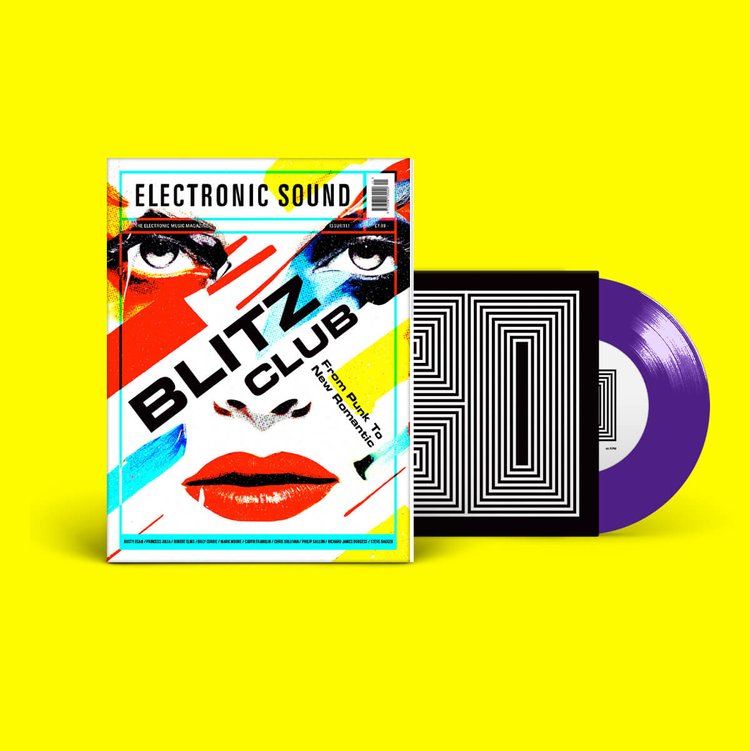
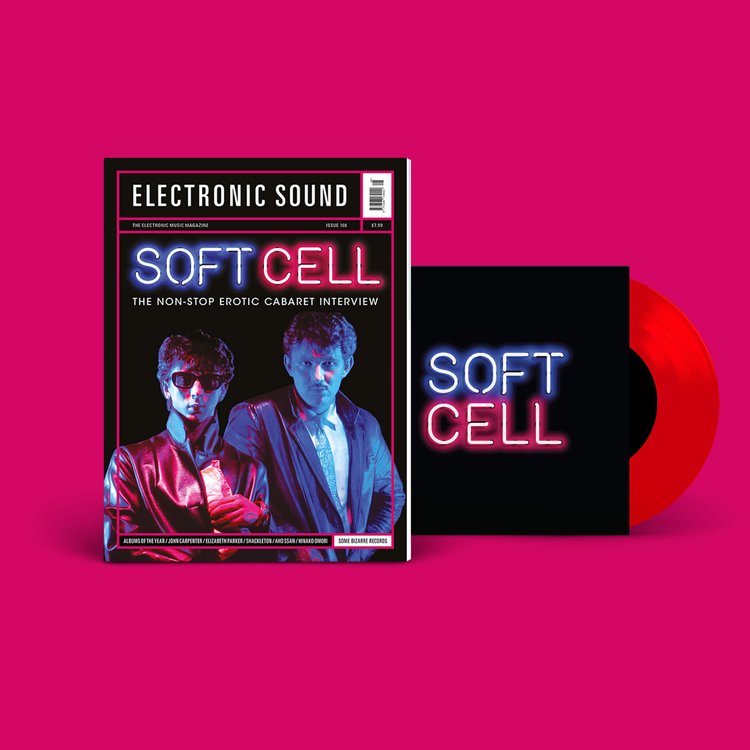
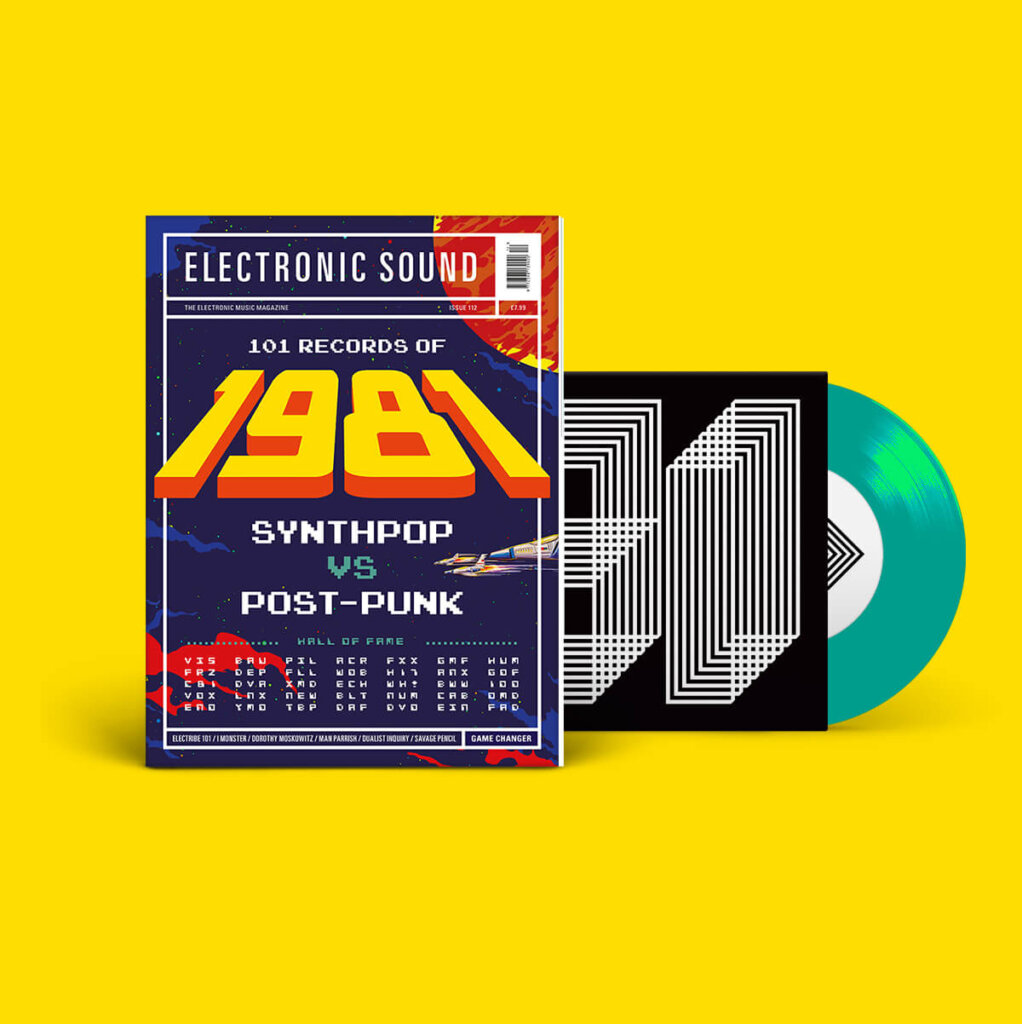
‘Sampler’ is completed by two tracks from Newton’s first solo album, the punningly titled ‘New Tones’. ‘Mycology’ begins like a muted jumble of electronic washing before morphing into a gauzy, pulsing drone garnished by Michael Somerset Ward’s eerie woodwinds. ‘Days And Nights’, the final track on ‘Sampler’, plants shadowy electronics over mahogany piano chords, underscored by the unsettling edge that charges Newton’s most effective work.
“It’s taken a while to get there, but it’s the first time I’ve done an album just as myself,” he says. “I always fancied doing a solo album, but I’ve never done it before because I was so busy with DVA and TAG. I’ve got a lot of new pieces in this kind of mould; electronics and piano, acoustics.”
Such a robustly vibrant blast of exploratory freshness can only merit investigation from anyone into electronic music over the last 50 years, yet these nostalgia-crazy times mean Newton still has to acknowledge his past. He’s happy that Mute is releasing Clock DVA’s early catalogue on vinyl, starting with 1980’s ‘White Souls In Black Suits’ and 1989’s ‘Buried Dreams’.
“‘White Souls…’ has done pretty well considering it was just a cassette,” he says.
“I was in London working on it at the cutting place and it sounds a lot better now. Originally, it was recorded live on two-track, but we’ve really improved it. I think it’ll be good on the vinyl edition; a more advanced version.”
He’s less inclined to play ‘Thirst’ from start to finish in concert though.
“You go back and do these things, but those feelings and times have moved on. Now it’s not so much a full-colour reproduction, more a version of it, a DVA-updated version.”
Looking back is fine, especially with a catalogue as auspicious as Adi Newton’s, but he’s more animated talking about the new records, Chaos Variant 12-inches or finishing his Neon Free project after starting it eight years ago, plus myriad other works in the pipeline. Newton’s first band wasn’t called The Future for nothing. Going on ‘Sampler’ and Sōon, that’s still where he’s heading. Watch this space.
‘Sampler’ and Sōon’s ‘Noise’ are both out on ARMComm.
For more, visit armcomm.co.uk
